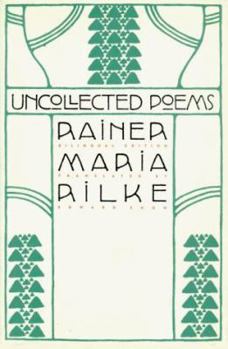Uncollected Poems
Between the New Poems of 1907 and 1908 and his death in 1926, Rainer Maria Rilke published only two major volumes of poetry--the Duino Elegies and the Sonnets to Orpheus, both in 1923. But during this... This description may be from another edition of this product.
Format:Hardcover
Language:English
ISBN:0865474826
ISBN13:9780865474826
Release Date:March 1996
Publisher:North Point Press
Length:265 Pages
Weight:1.33 lbs.
Dimensions:1.1" x 6.3" x 9.3"
Customer Reviews
5 ratings
The Best Way to Read Translated Poetry
Published by Thriftbooks.com User , 16 years ago
After four years in college double-majoring in both English and German, and after a long search for German literature that managed to inspire my literary sensibilities, I finally discovered Rainer Maria Rilke the week I graduated. Rilke's ability to capture moments in nature and to describe events in life both physical and spiritual transcends languages and cultures. His rhythm and use of sounds in poetry is something not to be missed. He is a true poet on every level. This edition of his poetry gathers together many different subjects and forms that show off his abilities perfectly. My favorite part of it, though, is that it is a bilingual edition. Poetry is difficult (if not impossible) to really translate from one language to another, so if you're reading the text only in English, you can only get one sense of the piece. While I won't judge the translator's interpretation, I will say that having the English and German texts side-by-side makes for a smooth read for German learners trying to read the German side, as well as for non-German readers who want to read the original for the sounds and the form it takes. Rilke is the perfect poet for Germanophiles with a British poetic sensibility. If you're looking for a book that combines a good poetic translation of Rilke's work with the original text, then this is definitely the one to get.
Wonderful Collection
Published by Thriftbooks.com User , 17 years ago
Rilke was one of the great imagists of the century. This collection contains magnificently translated poems by Edward Snow, who manages to capture the grace and power of Rilke's work. It is not altogether clear whether or not these poems were intended for publication, but it is a miracle that they were. Rilke was a poet of images and of feelings, he captured again and again the feeling of man the individual caught in the sublime beauty of the earth and the cosmos: "Earlier, how often, we'd remain, star in star, when from the constellation the freest, the announcing star, stepped forth and called. Star in star we marveled, He, the speaker of the star-sign, I, my life's companion star. And the night, how it granted us The wide-awake accord" (235). An excellent bilingual edition on the whole and a must for any reader of modern poetry.
Poetry Transcending Borders
Published by Thriftbooks.com User , 19 years ago
Edward Snow's translations of Rilke are always beautiful. As a non-German speaker, I don't have the luxury of commenting on the purity of the translation, but having had the opportunity to compare Snow's translation of Duino Elegies to an older textbook version, I would say that Snow has a firm grasp on both the significance and the beauty of Rilke's poetry. For those who have never read Rainer Maria Rilke, I strongly recommend beginning with these poems. While all his poetry books are powerfully moving, this one rises above the rest in its maturity, and also, due to its "uncollected" nature transcends the bounds of thematic elements. The arrangement is lovely, but I urge you to open this book at random. Whichever poem you turn to will gain different contours in the light of different moods, yet each has lines that resonate-you will find yourself remembering these gems at scattered moments, even months after reading them.
Wonderful, and some people might know what this is about.
Published by Thriftbooks.com User , 24 years ago
This book contains my favorite poem, but explaining it could be like trying to contend that 2001 is a really great year because it might help ordinary people realize how elements of life might be like understanding the line, "until suddenly out of spitefully chewed fruit." For me, this is the kind of poetry that Harold Bloom was trying to explain in his book, THE ANXIETY OF INFLUENCE/A THEORY OF POETRY, though Bloom's ideas ranged from Milton, with the question, "Why call Satan a modern poet?" (Bloom, p. 20) to more modern poets without suggesting that Rilke might have topped them all in approaching the capability suggested in Bloom's quotation from Kierkegaard, "What inwardness he might have attained!" (Bloom, p. 76). My favorite poem by Rilke starts with the line, "Long you must suffer, knowing not what," and ends with the assertion, "No one will ever talk you out of it." This poem explains as much about how an individual can feel, when utterly singled out by perception, as any of the puzzles that philosophy typically gropes its way through in its efforts to find a world that any one person can understand. And the other poems in this book are also outstanding attempts to deserve the honor of being considered great poetry on a very personal level. Among the host of contenders, the one which is easiest to find begins with the German word, "Aber," so it appears first in the German index. The English translation seems to be suggesting something. "But if you'd try this: to be hand in my hand / as in the wineglass the wine is wine. / If you'd try this."
Beautiful Translation!
Published by Thriftbooks.com User , 25 years ago
A beautiful translation as usual from Edward Snow. One of my more favorite books in my Rilke collection. Retains the beauty of the german to a high degree. Poems you may not see anywhere else anytime soon, and some fragments which are absolutely lovely.




